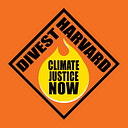With Teach-In, New Harvard Endowment Justice Coalition Launches
Campaigns Discuss Ways In Which Harvard’s Unjust Investments are Structurally Connected
Find a full description of the HEJC here. Find a list of action items for supporting the HEJC’s work in the time of COVID-19 here.
On Thursday, April 30th, Harvard’s divestment campaigns (Fossil Fuel Divest Harvard, Harvard Prison Divestment Campaign, Harvard Puerto Rican Debt Divestment Campaign, and Harvard Out of Occupied Palestine) came together to mark the launch of the Harvard Endowment Justice Coalition. In a public teach-in, the campaigns communicated the urgent need to transform the endowment into a tool for ethical and sustainable investment, accountable to the needs and voices of stakeholders inside and outside the university.
“It’s time to think about endowments in a fundamentally different way. That means listening to the voices of every community who is structurally impacted by its investments,” said Ilana Cohen, an organizer with FFDH. Citing Harvard’s long history of investment in industries perpetuating injustices for profit, the campaigns called for a new vision of Harvard’s obligations as a moral actor, beginning with, in the words of HPDC organizer Zoe Hopkins, “the radical transformation of institutional priorities through an intersectional and holistic lens.”
The teach-in began with members of each campaign speaking to the processes of reimagining their work in the time of COVID-19. Hopkins described how the coalition’s goals to aid their communities’ imminent needs correspond to its overarching mission: “We see divestment as a means to an end, that end being the complete abolition of the carceral state. During COVID we are working towards decarceration, recognizing that incarcerated people are disproportionately affected by the pandemic as prisons act as Petri dishes for a dangerous virus.”
Cohen concurred, drawing attention to the ways in which, as fossil fuel companies take advantage of this pandemic to accelerate pipeline construction, marginalized communities pay the price. FFDH organizer Eva Rosenfeld also noted that Harvard’s lesser-known farmland investments are equally implicated as its fossil fuel investment in the context of COVID. “Land-grabbing is a direct neocolonial project, and through the research of our partners GRAIN, we are only beginning to see the ways these forms of displacement impact the epidemiological effects of this global pandemic,” Rosenfeld said.
“Currently,” noted Christian Tabash of Harvard Out of Occupied Palestine, “there is a deficit in the institution at all levels of Palestinian voices and narratives.” Oya Gursoy, also of HOOP, noted the close relationship between prison divestment efforts and Palestinian liberation: “Harvard’s endowment should not be entangled with the prison industrial complex. If you agree with this sentiment, you already agree with our mission, in a sense. The prison industrial complex is in Palestine. Our struggles are not so different from one another’s.”
Jocelyn Bonadio-de Freitas, an organizer with Harvard Puerto Rican Debt Divestment Campaign, described Harvard University’s history of capitalizing on the debt incurred by economic exploitation and the destructive aftermath of Hurricane Maria. “I’m excited to work with all of you on joint, powerful actions that can hold these institutions accountable,” Bonadio-de Freitas concluded.
The teach-in concluded with participants taking direct action through signing through petitions, contacting congresspeople, and supporting aid funds. Any activists or campus groups interested in taking part in the ongoing process of strategizing for endowment justice, which takes the form of regular meetings between the involved campaigns, are encouraged to reach out through the contact information listed here.
